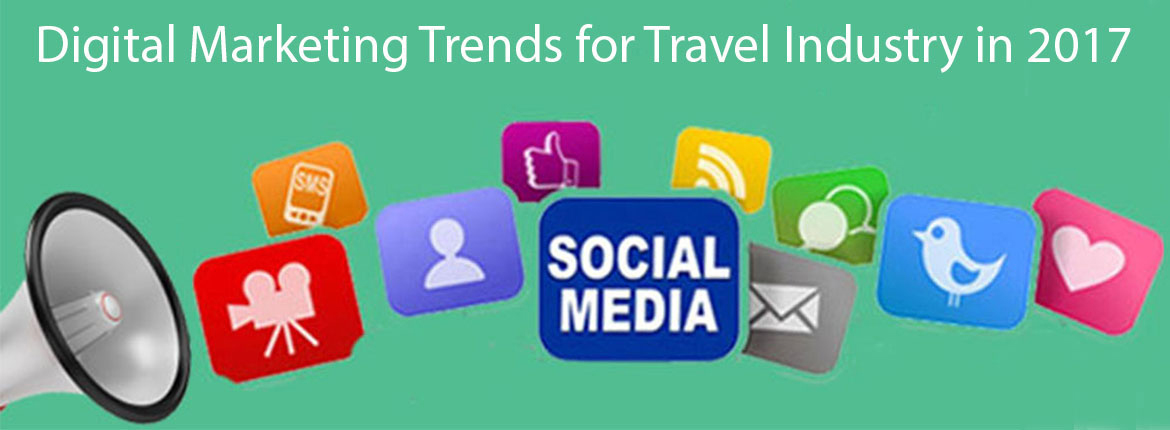Digital Marketing Trends for Travel Industry in 2017

Today, the majority of people use different websites for the guide and booking of journeys; by visiting them they either try to find information about a destination, read reviews or to book a trip online. In August 2016, a research published by the Association of British Travel Agents (ABTA) found that 76% of UK internet users had booked holidays digitally in the past 12 months. In the US, Emarketer estimates that 52% of trip bookers use online platforms to make their bookings. That makes digital marketing techniques like SEO, UX and social media marketing absolutely critical to success in the travel industry. For the success in travel industry, one need to keep up with the latest trends in digital marketing that are impacting the travel sector.
The most important trends are as follows:
Virtual Reality could offer travelers the opportunity to 'try before you buy'.
From taking a virtual romantic honeymoon walk along a sun-drenched beach to strolling around a hotel suite, technology brings everything to the expected travellers in ways that a few years ago would have seemed impossible.
However, when considering about virtual reality and travel, it is important to separate the hype from the practical.
Travel companies taking advantage of such technology should primarily consider it as a platform for useful content, rather than an immersive multi-media channel where visual effects weigh more than substance.
Working with Google Cardboard technology, Virgin Holidays used VR headsets to capture the 360° video sights and sounds at one of their resorts in Mexico. Customers were impressed by the VR experience at Virgin Holidays stores, and were drew great interests to experience them in the real world. Virgin reported that not only the sales of the featured resort showcased by VR technology rose significantly, but also sales across the globe has increased.
Airlines is one of the first to apply VR in their marketing mix. For example, at the Global Business Travel Association conference held in November 2015, two mainstream airlines – Delta and Lufthansa utilized immersive technology to demonstrate differences between various classes of cabins.
Lufthansa demonstrated their cabins by inviting would-be passengers to sit on a dedicated chair and controlled the immersive experience via a PlayStation Move Motion Controller.
With Qantas’ Samsung Gear VR headsets, airline’s network destinations are displayed in the popular entertainment content and tours.
Shangri-La Hotels was the first international hospitality brand to equip Samsung Gear VR headsets for each of its 17 global sales offices and 94 individual hotel sales teams.
Finally, a study from University of Melbourne found that 40-second long “microbreaks” immersed in VR natural environment could improve workers’ concentration.
In 2012, Gartner updated its definition about Big Data as follows: "Big data is high volume, high velocity, and/or high variety information assets that require new forms of processing to enable enhanced decision making, insight discovery and process optimization.
Big data involves a large quantity of data which is analyzed usually by computers to reveal patterns and trends that relate to human behaviors and interactions.
As travelers seek more relevant and trusted content, OTAs are increasing their investment in Big Data analytics. Strong data capabilities help identify visitors across different channels and devices, facilitating personalized marketing and customer journeys.
According to a whitepaper published by the World Travel and Tourism Council travelers are more informed than ever before.
In an American Express study, 83% of millennials said they would allow travel brands to track their habits in exchange for a better, more individual experience. Meanwhile, 85% of respondents across all age groups said that customized itineraries are far more appealing than one size fits all solutions. As analytics becomes more sophisticated, travel companies are targeting different customer demographics via emails and social media messages.
However, automated real-time location based triggers could send automated updates such as “You are only steps away from a bargain in London Heathrow Airport’s Terminal Two.” It may be welcome by some holiday makers seeking a duty-free bargain. A location-based trigger such as “Your Facebook friend just checked in a motel around the corner” may be taking big data solutions one step further.
43% of travel companies regarded “targeting and personalization” as the top priorities in their digital strategies. 25% of companies focused on mobile optimization for their online properties.
Multi-channel Marketing Becomes the Norm
A great deal of the traffic is diverted away from Bricks and Mortar towards digital platforms, as more people are traveling for leisure and business. Globally, the online travel sector is expected to grow at an annual rate of 3.8% over the next decade to $11.4 trillion, creating a market four times the total scale of the current UK economy.
In 2016, travel industry experts broadly agreed that international terrorism affected demand for air travel. Yet the International Air Transport Association (IATA) reported that during June 2015, global passengers in the key travel month of June (measured in revenue passenger kilometers or RPKs) actually rose 5.2% compared to last year. Seat capacity in June (available seat kilometers or ASKs) increased by 5.6%.
Driven by digitization and consumer’s reliance on mobile devices, OTAs continue to remain robust. For example, Expedia’s second-quarter gross bookings for 2016 grew by 25% YoY (year-over-year) to $18.8 billion. However, in regions such as the US and Europe, the online travel market appears to be over mature.
Market realist claimed online booking accounted for more than 40% of total travel sales. In most countries, online bookings are seeing healthy growth. The main market drivers for OTA companies are digitization, mobile adoption and international expansion.
Reportedly many OTAs are expanding their business in specific countries including China, Brazil, Germany, India, Italy, Mexico, Norway, Spain and the United Arab Emirates. All these countries have an established tourism industry as well as a digitally savvy middle class.
China Marketing Agency
-
China All-media Marketing
Beyond Summits Ltd is a leading all-media China marketing agency, offering one-stop total marketing solutions.
-
CROSS-BORDER MARKETING & GLOBAL MARKETING
Helping you connect your brands with international consumers & clients.
-
CHINA DIGITAL MARKETING, SOCIAL MARKETING & MOBILE MARKETING
We’re a leading digital, social and mobile marketing agency in China.
-
CHINA ADVERTISING & MEDIA BUYING
As the leading advertising agency, offering professional services of global media buying, advertising creative and production.
-
DESTINATION MARKETING & DESTINATION BRANDING
Providing professional services of destination marketing & branding to both international and China domestic destinations
-
MICE
We offer MICE services from venue finding, hotel accommodation to the complete management of your event.
-
Event & PR
We offer comprehensive services of online and offline event, EPR and TPR.
-
China Marketing Consultant
Providing Chinese consumer insight, China market research and China marketing strategy consulting services












